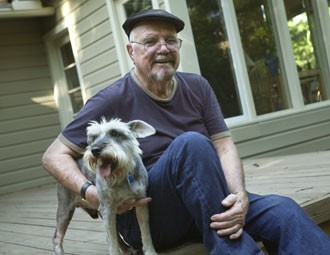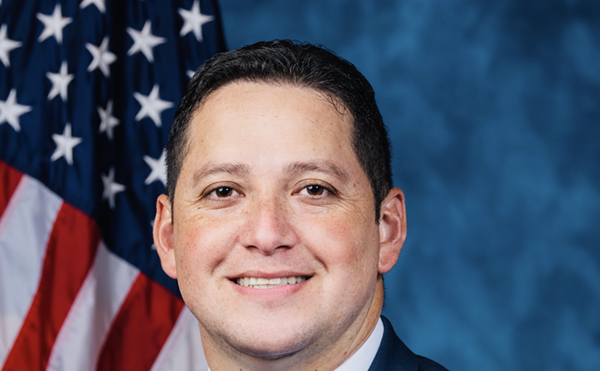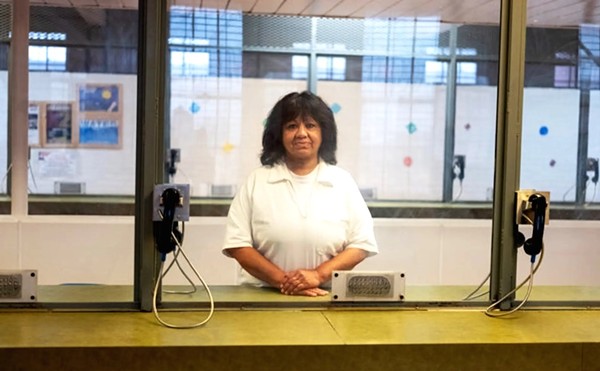At 86, Walter Starcke says he’s learning to walk his talk
There’s just no pinning Walter Starcke down. Ask him what he professes, and the cheerful octogenarian will answer, “to be alive.” Ask him what his next lecture is going to be about, and he’ll provide, “the answer to everything.”
Starcke isn’t being coy or vague, he’s turning the questions over, considering all the possible answers. In his lifetime, he’s been an actor, a Broadway producer, and a businessman, but right now he’s more interested in the other ways that we define ourselves. That’s the next lecture. “I’m not a man of earth or a man of God,” he says. “I’m both. And my job unto life is to make those two me’s communicate and get along together. Anybody who is all this or all that is missing the boat.” Meaning, he can quote scripture with the fiercest evangelist, but he also likes his margaritas, has a brand-new, tomato-bisque-colored Saab, and, in relating his long and varied history, will name-drop like crazy.
| In his spiritual quest to understand all of the world’s religions, Walter Starcke, pictured here with his dog Hugo, has been around the world five times times. He is a local a religious lecturer and a writer of spiritual guidebooks. |
Starcke’s spiritual journey began in 1945, when, as an officer in the U.S. Navy, he decided not to return home after World War II. “At the end of the war I didn’t want to go back to Texas and the hypocrisy of the society I’d been brought up in,” Starcke says. “So, I went to New York where I could live in Greenwich Village in any kind of lifestyle I wanted, and no one would point fingers at me.
“The only thing I could bluff my way into was the theater, and extraordinary things began to happen to me,” he adds.
In New York he had his first epiphany. One evening, he was mugged in an alley as he walked home. (“To be frank with you, I was drunk,” he admits.) His assailants took his coat and money, and he woke up in the morning with a black eye and bruised face. “I couldn’t go looking for work like that,” he says, “but as I lay there, it was like a dam opening, and then the thing said to me, ‘Study the world’s religions, and if you can find truth in all of them, you might be able to trust that.’”
Starcke acted for five years, during which time he met and worked with playwright and director Joel van Druten. The two collaborated on Bell, Book, and Candle and The King and I, and, in 1950 Starcke produced van Druten’s play I Am a Camera, which eventually was made into the musical Cabaret.
While in New York, Starcke met and befriended many of theater’s great minds, including Noel Coward, Cole Porter, and Tennessee Williams. Yet, the most influential person in his life would not be one of his writerly cohorts. In 1946, van Druten introduced Starcke to Joel Goldsmith, mystic and author, whose teachings centered on the Infinite Way, a method of communicating with God through silent prayer and meditation. In keeping with his desire to learn about the world’s religions, Starcke would study with Goldsmith for 18 years, often traveling and lecturing with the guru. “Joel was an extraordinary man,” says Starcke. “I’ve never taught the Infinite Way, no one but Joel could, but I’ve referenced his teachings in every book I’ve written.”
Goldsmith died in 1964, and 35 of his books are still in print. Starcke’s current writing project, Joel & I, is an autobiographical account of their relationship. “It’s going to shoot me out of a canon,” Starcke says. “It’s not just the effect a spiritual master had on an eager young student; it’s archetypal of any father-son relationship.”
For all the success he had in New York, Starcke says he had a love-hate relationship with the city. “My inner thing told me that, when I was as happy to be there as anywhere, I could leave.”
And so, in the early 1960s, Starcke abandoned the comfort of his fabulous Hotel des Artiste apartment and moved next-door to Tennessee Williams in Key West, Florida. There, Starcke helped form the Old Island Restoration Foundation, a successful revitalization project, and turned an old bank building into a silkscreen factory — the one where Lilly Pulitzer’s first designs were manufactured.
He also wrote three spiritual books: The Double Thread, The Ultimate Revolution, and The Gospel of Relativity. “All the world’s religions have had some wonderful presence, whether you call it God or Allah, or whatever,” Starcke says, describing the essence of his books, “but they all say you’ve got to get rid of your humanity — lock it up in the false morality we’ve created — and that creates a duality.
“Anyone in the religious field who doesn’t share their humanity is laying a guilt trip on everyone else. So, my quest in life, until this minute, is to close that gap between our divinity and our humanity. Until we do that, we can’t be whole,” he adds.
The books sold well and Starcke was a success in Key West, but he wasn’t happy. He came back to San Antonio, only to have his mother pass away, a catalyst for what he calls his “dark night.” “When she was alive, I was both our favorite topics,” he admits. “She was always here; when she died, there was no one like that. I was really lonely.”
In his sadness, “that thing” that had always spoken to him, his intuition, went silent. “It’s just like any other thought, except that it comes from a different place,“ Starcke explains. “It’s a thought I hear. And without it, I didn’t know how to buy a can of beans at the grocery.
“Some people have a hard time dealing with their divinity,” he adds. “I think I have a hard time dealing with my humanity.”
When Starcke recovered, on his 54th birthday, he considered moving to Hawaii, but his intuition told him that was an escape, that he belonged in “the middle of things,” and showed him the image of a spine that started in Canada, passed through San Antonio, and ended in the Yucatan. “I saw all this energy in Texas, a lot of redneck energy,” he says, “but it was energy waiting to be transformed; not by me, but I wanted to be a part of the transformation.”
Returning to San Antonio in the early ‘70s Starcke bought the Guadalupe River Ranch, which had previously been a “chicken ranch” and farm for delinquent children. “I tell you, when I moved there that place was evil,” says Starcke, who first turned it into an artists’ commune, and then a highly successful seminar center and resort. “That kind of forced me to deal with humanity,” he laughs, “because every night I’d return to the ranch, and there’d be a horde of people waiting to tell me about all their problems.”
Perhaps because of that, Starcke sold the controlling share of the ranch three years ago to focus on his writing — since returning to San Antonio he has written four more books — and lectures. So, what is the answer to everything?
Starcke answers in a stream of consciousness: “Love God and your neighbor, and when you can do both perfectly they are like unto each other, but he gave us a priority: Seek ye first the kingdom of God — the subjective side, love, forgiveness, compassion — take no thought for the morrow what ye should eat or what ye should wear — the material or objective side — consider the lily of the valley; they toil not, neither they spin, but Solomon though rich with jewels all over him was not as beautiful as one of those.
“That’s my teaching in a nutshell,” he adds. “If, subjectively, you want to achieve peace, do you drop bombs? Our government has got it totally reversed; they should be building schools and feeding people.”
As for humanity, Starcke has settled into a strong community in San Antonio, including a regular Friday-night supper club of friends who get together for dinner and conversation. “I’m happier now than I’ve ever been, because I’m not lonely,” he says. “I used to think I was all alone in my beliefs, but now I’ve met people who also believe in things.”
That doesn’t mean he’s done seeking. “Still to this day I have a club,” he says. “Do you want to join? The dues are pretty big because they are personal. It’s the TTP Club: Trust the process. Do that, and you can get rid of God, because God is the process.”


















